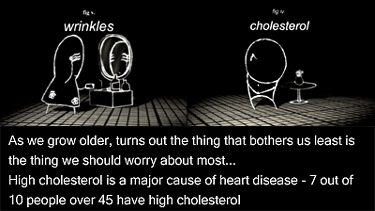Thursday, November 09, 2006
Lewis Wolpert - Six Impossible Things Before Breakfast - The Evolutionary Origins of Belief - Part 1 - Introduction
Lewis Wolpert is a Rationalist who appeals to reason as a source of knowledge or justification & in which the criterion of truth is not sensory but intellectual and deductive. He is a Materialist and Vice President of the British Humanist Association . He describes himself as a Reductionist Materialist Atheist or an Atheist Reductionst Materialist (the difference escapes me). He is not religious and knows of no good evidence for God. Nor has he any beliefs in the spiritual world or paranormal happenings. A commited scientist he views science as the best way of understanding the world.
Synopsis
Why do 70 per cent of Americans believe in angels, and thousands more that they have been abducted by aliens? Why does every society around the world have a religious tradition of some sort? What makes people believe in things when all the evidence points to the contrary? Why do 13 per cent of British scientists touch wood? In "Through the Looking Glass", the White Queen tells Alice that to believe in a wildly improbable fact she simply needs to 'draw a long breath and shut your eyes'. Alice finds this advice ridiculous. But don't almost all of us, at some time or another, engage in magical thinking? Professor Lewis Wolpert investigates the nature of belief and its causes. He looks at belief's psychological basis and its possible evolutionary origins in physical cause and effect. How did toolmaking drive human evolution? Is it the lack of an explanation about fundamental questions which is truly intolerable? Are we born with an evolutionary propensity to believe in things that make us feel better? Wolpert explores the different types of belief - including that of animals, of children, of the religious, and of those suffering from psychiatric disorders. And he asks whether it is possible to live without belief at all, or whether it is a necessary component of a functioning society.
Introduction
Why is their a general absense of belief in the scientific method - verging on an anti-science movement? Surely science and the necessity for evidence is the best way to understand how the world works. By corollory why is the belief in the unbelievable so prevalent - from religion, aliens, telepathy and angels? How can people believe in something without a shred of reliable evidence? His aim is to understand what people believe about causal events (an example would be good here).
What distinguishes our thinking and beliefs from other animals and how has this been a part of evolution. How has our brain structure evolved? Our genes determine how our brains will work whilst culture, learning and nurture are of secondary importance. Evolutionary adaptiveness of the mind produces our behaviours, thoughts and beliefs helping humans to survive better.
Posted by
crabsallover
at
Thursday, November 09, 2006
0
comments
![]()
Labels: Atheism, evolution of religious belief
British Heart Foundation - 7 out of 10 over 45 have high cholesterol
Measuring cholesterol levels involves a simple blood test. This can be done either through a full blood test or a pinprick test. It is measured in millimols per litre of blood. These tests should always be carried out by a GP or trained health professional rather than using a self test kit. What is the ideal cholesterol level? The BHF advises that people should have a total cholesterol level of under 5 mmol/1 and a LDL level under 3 mmol/1. The average blood cholesterol level of people living in England is 5.5mmol/1. This is high compared to other countries. For example, in China the average is 4.5mmol/1. Who is at risk? Those most at risk are those people who have a high intake of saturated fat in their diets. However, you can lower your cholesterol level by reducing your saturated fat intake, increasing the amount of physical activity you do and increasing your intake of fresh fruit and vegetables. BHF launched a campaign to highlight cholesterol - and get people to think more seriously about the health of their heart. Today, nearly half of all deaths from coronary heart disease in Britain are due to raised cholesterol. People should take positive steps to look after their hearts by cutting down saturated fats, increasing the amount of physical activity they take and eating more fresh fruit and vegetables. You may have seen our adverts on TV, which show a series of animated characters worrying about the outward signs of ageing - such as getting wrinkles and loss of hair. But all of the characters show scant regard for their health - and especially their hearts. Watch the ad here. And today ex Malaysian Prime Minister has heart attack.
My cholesterol level is 5.2 mmoles /Litre (Boots test) or 5.1 (GP Nurse test). British Heart Foundation say it should be <5.0>
How is cholesterol measured?
Posted by
crabsallover
at
Thursday, November 09, 2006
0
comments
![]()
Labels: cholesterol, fruit and vegetables, heart, heart attacks













